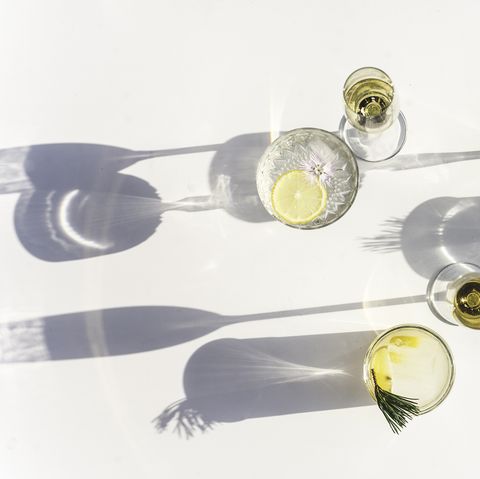Is Intuitive Drinking a Good Way to Cut Back on Alcohol?
Maybe you’ve heard of “intuitive eating,” the approach to a healthy diet that doesn’t involve dieting.
Instead of dietary prescriptions, intuitive eating encourages a healthful approach to food. You eat when your body tells you that you’re hungry and you stop eating when your body tells you that you’re full. No food is off limits. No food is “super.” Your meals are meant to nourish you, in all senses of the word.
This shift in perspective alleviates the guilt and shame that fuels most diets and establishes a beneficial, long-term approach to healthful eating.
“With a lot of food rules, diet rules, and diet guidelines, we learn to check out from our own internal cues,” says Heather Caplan, R.D., host of the RD Real Talk podcast. “Part of intuitive eating is re-learning how to check back in with ourselves. We come back to our own intuition, listening to the signs from our bodies in terms of hunger, satisfaction, and fullness.”

Enrique Díaz / 7cero
If all this sounds entirely too simple, that’s sort of because that’s what intuitive eating is: an opportunity to cast aside all the problems of crash diets and return to a more basic way of life.
Like intuitive eating, intuitive drinking asks that you check in with yourself before you drink and while your drink.
These three key questions can help.
Why am I about to have this drink?
This is about being self-aware, Caplan says.
“It’s a time to check in with yourself emotionally. Are you having a drink to numb out or distract yourself from feelings? Or are you having a drink because it’s something you like to do? Does taking this drink feel like a healthy choice for you?”

Jena Ardell
There’s emphasis on that last part, because Caplan also encourages looking at your drinking habits in the larger context of your personal and family history.
“I tell my clients that the word ‘healthy’ is subjective,” she says. “Do you have a family history of alcoholism? Or a history of binge drinking? Then maybe your definition of ‘healthy’ is different from someone else’s.”
Think of two scenarios.
In the first, you just got dumped (sorry, man). You call up a few friends, invite them over to split a bottle of something, and you drown in your sorrows just like every cliche country western song.
In the second, you’ve invited a few friends over for a cookout. You’re relaxing on your back deck. A buddy offers you a beer. You’re feeling good about life, so you decide to have one.
Which feels healthy to you?
Is this something I like drinking?
With intuitive eating, “satisfaction” differs from “fullness.”
“Satisfaction” means being happy with a food choice you’ve made, Caplan says, while “fullness” is the feeling associated with eating enough. “If you’re satisfied you should feel a sense of fullness. If you’re full, you might not always be satisfied.”
Same goes for alcohol.
“Maybe you like a higher-calorie, higher-alcohol drink, but you pick something else because you feel guilty drinking that other drink. That’s how you can five drinks of something you don’t like. You don’t feel satisfied,” Caplan says.

Westend61
If you love a particularly potent double IPA, you might derive more satisfaction in having a bottle than polishing off a sixer of low-calorie beer.
Not only should you ask yourself about the rationale behind your decision to have a drink, but your decision to choose the drink you’re about to drink.
Is your approach to alcohol, in general, a healthy one?
As Dry-uary gears up and the “sober curious” movement grows, it’s also important to ask yourself why you feel like you want to cut back in the first place.
“Restriction often brings about bingeing,” Caplan says. If you’re going to take part in a no-booze week, or month, or six months, it’s important to plan for what happens at the end of the set time period. Otherwise, you run the risk of plunging back into unhealthful drinking.
Which brings about another important point.
If you feel like you have a greater problem than just “cutting back,” or you’ve tried cutting back and keep returning to destructive drinking, it might be time to consider professional help via resources like the SAMHSA hotline.
Source: Read Full Article
